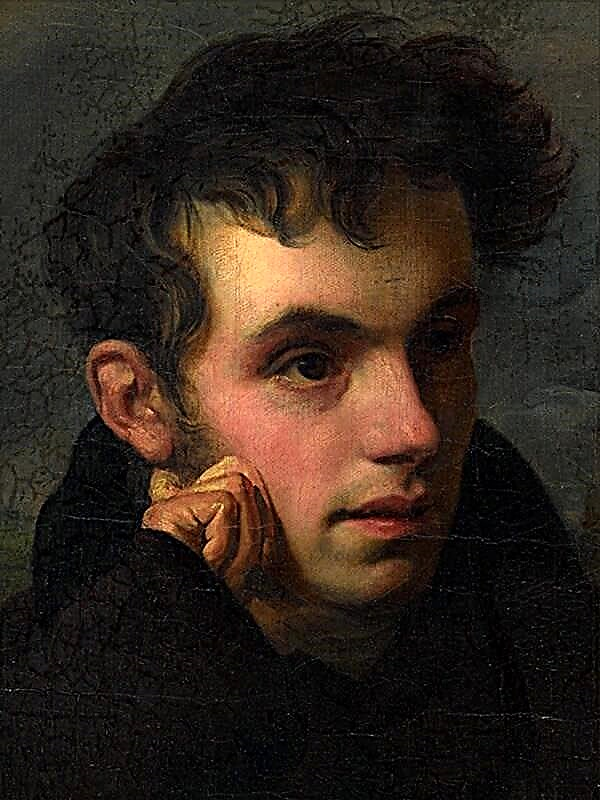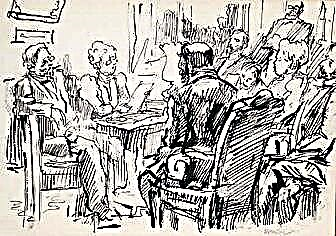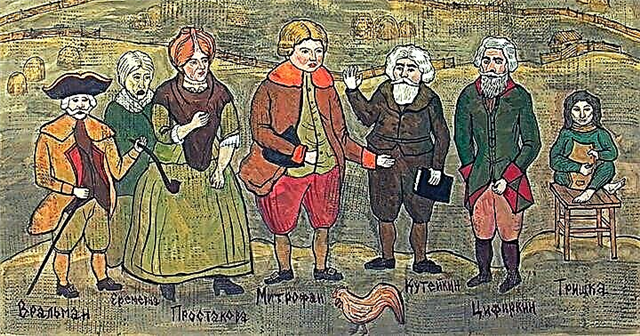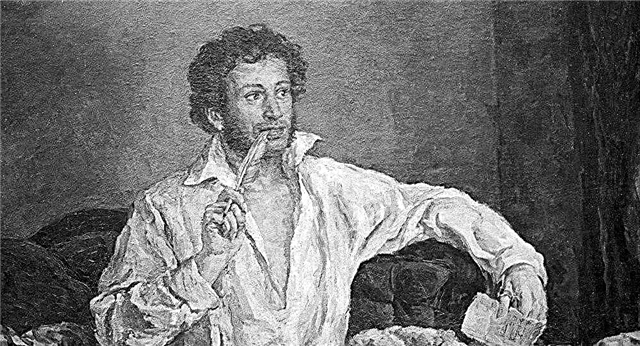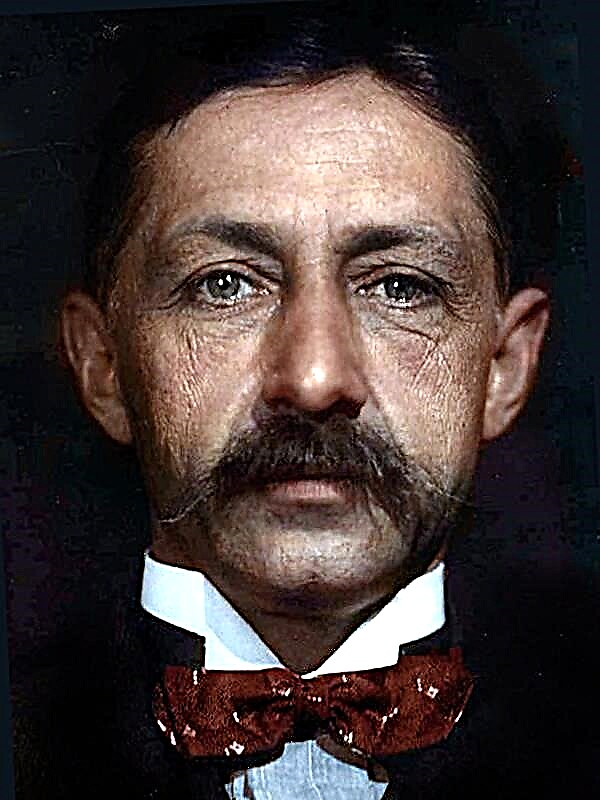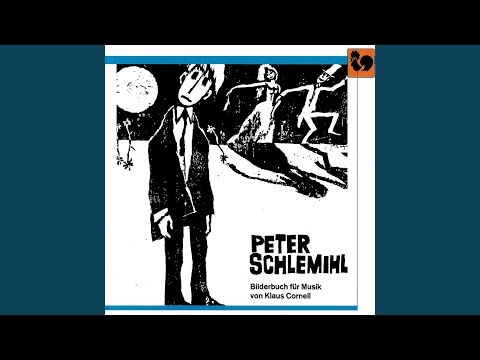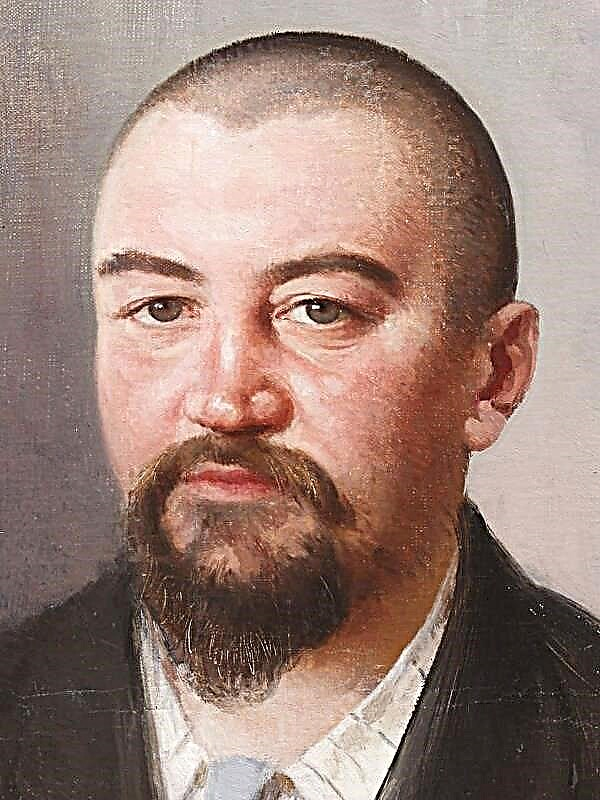The final essay is the most important test on the road to the exam. If you do not pass it, you can not even think about passing the unified state exam. Therefore, it is so important to start diligently preparing now! A little time, a couple of months. But by joint efforts we will overcome everything. Joint? Yes! Write in the comments which work was not enough, and we will make an argument on it!
Content:
- 1 M. A. Bulgakov, “The Master and Margarita”
- 2 F. M. Dostoevsky, “Crime and Punishment”
- 3 A.P. Chekhov, Ionych
- 4 A. S. Pushkin, “The Captain's Daughter”
- 5 A. N. Ostrovsky, Thunderstorm
- 6 I. Goncharov, “Oblomov”
- 7 A. Green, “Scarlet Sails”
- 8 N.V. Gogol, “Dead Souls”
- 9 A. Chekhov, Gooseberry
- 10 A. I. Kuprin, “Olesya”
- 11 I. Bunin, “Mr. from San Francisco”
- 12 N. Gogol, Nevsky Prospect
M. Bulgakov, “The Master and Margarita”
- Mikhail Afanasevich Bulgakov described the gap between a dream and reality in his novel "The Master and Margarita." The main character wanted to publish a book - the achievement of his whole life. For the sake of writing it, he left work, spent a lot of money won on the purchase of various works that helped him in his work. But in the end, he himself regretted that he so zealously sought to fulfill his dream. Critics immediately ran into the published passage, like a flock of ravens on a corpse. Insults began in the press, persecution of such an “anti-Soviet” writer. And the basement on the Arbat, which the Master paid by winning the lottery, did not bring happiness: he was set up and evicted by Magarych, pretending to be a friend. The hero finds himself in a madhouse, and he completely burned his novel. It turns out that a person should be afraid of his desires, because he can’t even imagine what they will turn into reality.
- M. Bulgakov speaks about the insignificance of some of our desires in the novel “The Master and Margarita”. Woland, at his performance in Variety, is ironic about the dreams of Muscovites: they are all obsessed with the "housing problem." The magician satisfies their pettiness and vanity, throwing packs of money into the air, dressing women in luxurious outfits. But the author of the novel showed the futility and insignificance of such aspirations literally: all the money and robes melted away or turned into empty pieces of paper. Thus, the dreams of all these limited and mean people turned out to be insignificant illusions, and Satan taught them a good lesson.
- The heroine of M. Bulgakov’s novel “The Master and Margarita” has experienced a lot to realize her cherished dream. The woman longed for the return of her beloved man, who had disappeared. She tried everything possible, but did not find out anything about his fate. And then one day she met a stranger who made a frightening proposal: take the cream, smear the whole body and wait for his call. After this, a meeting should occur with a foreigner who knows about the Master what Margarita so wants to know. The woman was very scared, but decided on this step. She forever left her husband and all her former life in contentment and idleness. She had to meet the devil and become the mistress of his ball. She suffered both pain and fear for the sake of love. As a result, the heroine was able to rescue the Master, but the fulfillment of her dream came at a high price. Thus, to get what you want, you need to make an effort, because just like that, dreams do not come true.
F. Dostoevsky, “Crime and Punishment”
- F. Dostoevsky in his work Crime and Punishment described a very dangerous dreamer who should beware of his desires. Rodion Raskolnikov sought to restore violated social justice and distribute the excesses of rich people to the poor. To do this, he chose the first victim - the usurer Alyona Ivanovna. This old woman wrapped up dozens of honest, but destitute families in debt nets. The hero kills her, and at the same time takes the life of her pregnant sister, who was a witness to the reprisal. But the fulfillment of his dreams turns into the collapse of all bright hopes. The stolen money did not help anyone, but only destroyed the peace of mind of the killer and the thief. Thus, some desires are really worth fearing, since in reality they can only be embodied in ugliness and sinfulness.
- Reality is sometimes not able to defile the dream, as the author of the book Crime and Punishment, F. Dostoevsky, proves to us. Sonia Marmeladova dreamed of converting Rodion to the Christian faith and directing him on the righteous path of atonement for sin. Therefore, the girl goes to a moral feat: she goes to hard labor after her beloved. The harsh realities of prison life did not break the exalted soul. The heroine adapted herself to cruel orders and supported many prisoners with her care. Everyone loved her. Even the proud heart of Rodion melted. As a result, Sonya’s wish came true: her chosen one renounced the inhuman theories. In the epilogue, we see how he reads the Bible enthusiastically, imbued with wisdom and mercy. Thus, even the most unrealizable, it would seem, dream can break into reality and not be defiled by it if a person ardently believes in what he is doing.
A. Chekhov, Ionych
- In the story of A. Chekhov “Ionych”, the hero dreams of his realization in the profession. He wants to make a great contribution to the development of medicine, wants to help people and bring good to this world. But Dmitry finds himself in a remote province, where his sincere impulses to the light are drowned out by the impenetrable darkness of philistinism and vulgarity. The whole environment of the young doctor draws him into a swamp of monotony and boredom. Here, no one is striving for anything, no one is hungry for anything. Everything goes on as usual. And Startsev also betrays his dream, becoming an ordinary middle-aged fat man. He is rude and grumbling, serving the annoying patients, whom he considers exclusively as a source of income. Now he only wants to sit in the club and play gambling. By his example, we understand that betraying our ideals and dreams promises complete spiritual degradation.
- Not all dreams are destined to come true, and this is the norm. This thesis is proved by A. Chekhov in the book “Ionych”. Katerina wants to become a virtuoso pianist, but can she do it? Hardly. Not all people are given true talent. But the heroine does not understand this, showing off her ability to drum on the keys. She even rejects Dmitry’s offer, leaves her father’s house and spends several years in the capital, trying to learn to be a pianist. And what is the result? Youth fades, beauty fades, and a dream turns into sick injections of ambition. The girl returns home with nothing, dimly realizing her own mediocrity. But was it worth it to get carried away and reject the young man? Not. But the past cannot be returned, and Katerina tries in vain to remind Dmitry of previous feelings. Thus, not all dreams are given to a person to realize, and he must accept this fact courageously and calmly, directing his efforts in a different, more suitable direction.
A. Pushkin, “Captain's Daughter”
- Alexander Sergeyevich Pushkin in his historical novel “The Captain's Daughter” describes devotion to a dream that culminated in the embodiment of desire. Marya Mironova fell in love with Peter and dreamed of marrying him. But fate kept putting them in the wheel all the time: at first Shvabrin told his father Grinev that the dowager was eager to lure the rich heir into a trap. An elderly nobleman naturally forbade this marriage. Then Marya became a prisoner of Alexei, and he forced her to marry him. It would seem that the poor orphan had to accept the offer, there would be no better wait, but the girl stubbornly waited for her beloved. When the liberation took place, she again had to lose Peter. He was convicted of imaginary help to Pugachev. And then the heroine was not afraid to go to the empress herself. Such fidelity to the dream, finally, led Marya to fulfill her desire: she became the wife of a loved one.
- Sometimes people are ready to go to any abominations, if only their dream came true. Such an example is described by A. Pushkin in the novel "The Captain's Daughter." Alex wanted to marry Marya, but she rejected him. The beauty also fell in love with the new garrison officer, Peter. Then Shvabrin decided to achieve his intrigues and even betrayal. He denigrated the reputation of Mironova and her family in the eyes of Grinev. Then the brave young man appointed a gossip duel, defending the honor of his beloved girl. And Shvabrin again showed meanness, taking advantage of an unfair reception. And when the rebels seized the fortress, the hero did not lead an eyebrow, betraying his middle name. It was then that he decided to take his wife by force and coercion, not stopping at nothing. Grinev prevented him in time, and yet Alexei was ready to step over all moral prohibitions, if only to achieve the fulfillment of his dream. Because of such unscrupulousness, it did not come true, because in any desire it is important to maintain dignity, otherwise you will only distance yourself from your dream, because you will become unworthy of it.
A. Ostrovsky, Thunderstorm
- In the play “Thunderstorm” by A. Ostrovsky, the main character dreams of a happy and free life. But the marriage did not live up to her hopes: the husband was under the iron heel of his mother, who sent reproaches every day of the existence of a young family. If the son could still run away for a while in a tavern or on business, then his wife took on the brunt of the relationship with her mother-in-law. Reality brutally deceived the expectations of an exalted and romantic girl. She thought that all families, like her parents, live in harmony and understanding. But her dream of love is not destined to come true even outside the scrap of Kabanikh. Boris was another disappointment. His love did not extend beyond Uncle's ban. As a result, from the collision of reality with the world of dreams, the heroine loses the strength to live and kills herself. Thus, the conflict of reality and dreams can lead to tragedy.
- Dreams come true, but not by themselves. To do this, you need to do something. But often people do not understand simple truths, and A. Ostrovsky described such an example in the drama “Thunderstorm”. Tikhon loves his wife and dreams of living with her in the warmth and harmony of the family hearth, but the hero’s mother constantly pesters the young with her eternal desire to control everything. It would seem that this problem can be fixed, but Tikhon is a weak-willed and apathetic person, to whom any business seems an overwhelming burden. He is afraid of his mother, although he has already become a grown man. As a result, he pulls the strap of a difficult life, not trying to realize his desires. This was enough to bring the unfortunate Katerina to suicide. In the finale, the hero mourns his wife and reproaches his mother for the collapse of all his hopes. But only he is to blame.
I. Goncharov, “Oblomov”
- In I. Goncharov’s novel “Oblomov,” the hero gets stuck all his life in fantasies, hiding from reality in a warm bathrobe on his favorite couch. He practically does not leave the house, but often thinks that he will come out and do something. Ilya Ilyich only dismisses all the demands of reality (theft in Oblomovka, the need to leave the apartment, etc.), trying at all costs to throw his worries about affairs to someone else. Therefore, Oblomov is always surrounded by fraudsters who benefit from the friend’s incessant escape from reality, where they shamelessly rob him. The reverie of Ilya Ilyich leads him to a standstill. Living days in illusions, he forgot how to do something, so he loses his beloved Olga, skips the rest of the inheritance and leaves his son an orphan without a fortune. Oblomov dies in the color of his life from his way of life, although not from his way of thinking, because it is he who brings a man to complete physical and spiritual degradation. Thus, excessive daydreaming threatens a person with irreparable and dire consequences.
- Our dreams do not always lead us on the right track. Sometimes they confuse us in the depths of the labyrinths, from where it is difficult to get back. Therefore, it is necessary in time to distinguish our true desires from false and imposed ideas about what we want. In the novel by I. Goncharov “Oblomov” is just such an example. Olga Ilyinskaya imagines herself to be the savior of Ilya Ilyich and began to persistently remodel him. She did not spare his habits, did not reckon with his opinion, and did not love him as he was in real life. She saw in front of her only an illusion, which she dreamed of making. Therefore, their relationship did not work out, and the heroine herself fell into a stupid position. She, young and beautiful, almost herself made an offer to the lazy fat man who in every way slowed down the process. Then the woman realized that she lived in illusions and invented love for herself. Olga, fortunately, found a more suitable husband and said goodbye to false desires, which could make her unhappy if they were fulfilled. Thus, not all dreams lead us to a happy future.
A. Green, “Scarlet Sails”
- In Green’s Scarlet Sails, the heroine proved by her own example that even the wildest dreams come true if a person believes in them wholeheartedly. Once a little girl received a prediction that a prince would come for her on a magical ship with red sails. Assol believed in the designation and began to wait for that mysterious stranger, although everyone around laughed at her naivety. Society took on her a negative attitude towards her father, and the girl grew outcast. Moreover, she was considered crazy, because who in her right mind would believe in stories about fairy-tale ships and beautiful princes? But the heroine stubbornly believed in her lucky star, and not in vain. The brave sailor found out about her dream and fulfilled it, deciding to support the beauty. As a result, Assol waited for the fulfillment of her desire, despite the fact that no one believed in her. Thus, in order to realize your dreams, you need to be a brave and independent person devoted to your ideal.
- To fulfill his dream, a person sometimes has to sacrifice a lot. For example, Arthur Gray from the story “Scarlet Sails” was forced to leave his house and break ties with his family to become a sailor. His parents were famous aristocrats, representatives of the ancient dynasty. Their only son was destined for the fate of a diplomat, because his father was an important government official. However, the boy wanted to live differently. The gloomy and pompous atmosphere of the mansion depressed him. He wanted freedom and variety of travel. But the family did not approve of his intentions. Then the 15-year-old boy fled home. No doubt it was hard for him to take this step, but he was able to get out of his comfort zone. This is the price of the dream.
N. Gogol, “Dead Souls”
- The difference between a dream and a desire becomes apparent when we find out what a person wants from life. The protagonist of the poem by N. Gogol "Dead Souls" wanted one thing: enrichment. For this, he traveled around Russia in search of landowners who could copy to him those peasants who had already died. So, the scammer intended to fraudulently obtain a loan by laying dozens of serfs, which in fact were not there. Obviously, Chichikov did not shun the lowest means in the implementation of his plans. He was not afraid to bet his honor, even freedom, because for such fraud you can go to court. But is the result of such a risk worth it? Is it for the sake of money that a person is ready to sacrifice everything that he has? This is a very petty occasion. For a dream, a simple desire for profit is not enough. This is just a consumer desire that is easy to satisfy. Most people have it; there is nothing in it that could inspire a person. A true dream is an ideal, a hardly attainable miracle, to which a person reaches. And that which is so prosaic and banal is called only a momentary whim - desire.
- One of the heroes of the poem N.Gogol's "Dead Souls" was particularly dreamy. Manilov lived in dreams, so in words he seemed like an ideal landowner. He dreamed of building a stone bridge across the pond, putting up tents and stalls for merchants there, in a word, organizing innovative trading floors. However, all the regulars at home knew that the owner had been telling this bike for several years. He also made the impression of a well-read and cultured person, but the book on his desk has been open on page fourteen for two years now. The nobleman was very concerned about the economy, but did not understand anything in it, so the manager robbed him. Manilov lived on the illusions that nourished his imagination. He had enough of these phantoms, he was not going to do anything to implement them. Therefore, not one of his grandiose plans will ever cease to be a plan.
A. Chekhov, Gooseberry
- A dream is a beautiful and inspiring extravaganza that leads us through life to the future that we want. But if dreams turn into a fanatical desire, close to obsession, then they can drive a person crazy. An example was described by A. Chekhov in the story Gooseberry. The protagonist more than anything else wanted to buy his own estate. There, he intended to grow his favorite garden berries and live in complete peace. For the sake of acquiring this paradise, he decided to waste himself. The man married by calculation, killed his wife saving and stinginess, and he himself was malnourished, if only to save money for the desired purchase. All hobbies, feelings, knowledge were forgotten. Nikolai Ivanovich lived only a dream. As a result, he achieved his goal, became a master with his estate and a saucer of sour gooseberries. But he lived in loneliness and complete idleness, having no family, no love, no work of his life. The hero became spiritually impoverished, scared all his friends, even his brother was not at ease in his presence. Extremes are not brought to good, even if they appear in dreams. Fanaticism destroys the inner world of man.
- In A. Chekhov's story “Gooseberries”, the protagonist proved by his own example that one should not dream only of material values, otherwise the dreamer's personality will degrade. Nikolai Ivanovich all his life strove only to find a manor, which his father lost due to debts. The son reacted very painfully to this incident from the family chronicle, and, apparently, this event influenced his worldview. He was ready to sacrifice everything in order to acquire an estate with a plot suitable for growing gooseberries. Nikolai Ivanovich married a rich, but middle-aged and ugly widow, and soon brought her to death with his avarice. Such behavior pushed all his acquaintances and friends. He was left alone, but with gooseberries, because he had bought a house and land. After the purchase, his sibling noted that the newly-minted gentleman sank and degraded. A petty and selfish dream led him to a philistine existence, which in no way can be called a full-fledged life. His full satisfaction has nothing to do with happiness. That is why it cannot be said that all dreams are equally sublime and beautiful.
A. Kuprin, “Olesya”
In the story of A. Kuprin, "Olesya", the heroine had a dreamy nature, so she imagined that she could deceive fate. She possessed magical powers, and with the help of cards she made a prediction that foreshadowed her the pain of communication with her lover. But the young witch was too fascinated by Ivan, and therefore allowed the dream of their love to come true. Their affair really continued easily and rapidly, the young people were crazy about each other. Apparently, due to this eclipse of consciousness, the girl succumbed to destructive illusions - she believed that she needed to go to church and lead the lifestyle that her chosen one liked. But reality turned out to be a cruel refutation of this sweet self-deception: Olesya was severely beaten by fanatical parishioners. She realized that daydreaming about an alliance with Ivan was not destined to break through the misunderstanding and prejudices of society. And the dream of subjugating fate also did not come true: inexorable rock followed the victim on the heels. Obviously, reality destroys our fantasies when we are under the stupefying spell of love and allow ourselves to dream of something that simply cannot come true.
I. Bunin, “Mr. from San Francisco”
In the story of Ivan Bunin, “The Master from San Francisco,” the hero’s dream does not come true, because he kept the deadline for its implementation and, in the end, died. He worked all his life, made capital, built his own business, and therefore he devoted little time to family and leisure. So, from a man he turned into a master without a name and individual traits. The hero became an ordinary businessman, in which he was able to discern only the presence of money. But he dreamed of something else - a happy life with loved ones, about travel and new sensations. But the man realized too late that he was really dear. And having not reached the cherished goal of the trip, he died at the first stop. All his dreams broke about his inability to deal with priorities. He postponed the important for later, and as a result, nothing came true.
N. Gogol, Nevsky Prospect
Not all dreams are equally beneficial to humans. Some of them are really worth fearing. For example, the artist from Gogol’s book “Nevsky Prospect” saw a beautiful stranger on the main street of the city. He immediately fell in love and followed her in the hope of getting to know each other. The imagination of a creative person endowed the girl with some magical charm. He followed her, and even seemed to see signs of attention from her side, but it turned out that a sweet young lady was leading him to a brothel. Seeing a vicious place, the hero was taken aback and ran away. At home, he desperately yearned for a young woman, more precisely in his vision from Nevsky Prospekt. He endowed him with extraterrestrial beauty, possessing a hypnotic attraction. He immediately decided to save his ideal, to tear it from the clutches of vice. But a second visit to the brothel showed that the desire was unrealizable. The girl laughed contemptuously in response to the sermons of the artist. All his illusions collapsed with a roar. He could not survive it. The conclusion can be drawn as follows: it is not necessary for impressionable people to chase dubious ideals. They need to be afraid of their imagination.
The collapse of hopes for the realization of a dream can hurt a person and deprive him of an incentive to life. For example, the hero of Gogol’s novel “Nevsky Prospect” is disappointed in the dream of saving a beautiful stranger. The young brunette, whom he saw on the street, turns out to be a worker from the house of tolerance. Piskaryov is very worried about this, but decides to rescue the girl from the captivity of vice. Opium greatly inflamed his imagination, and when intoxicated, the man could no longer adequately perceive reality. Arriving at the brothel, he began to preach a rejection of the immoral lifestyle. Naturally, the heroine only laughed at the guest. She was not going to change anything. But Piskaryov could not stand the collapse of hopes and committed suicide. The unfortunate person simply could no longer live, having lost his crazy dream, so the consequences of the destruction of dreams were so tragic.



